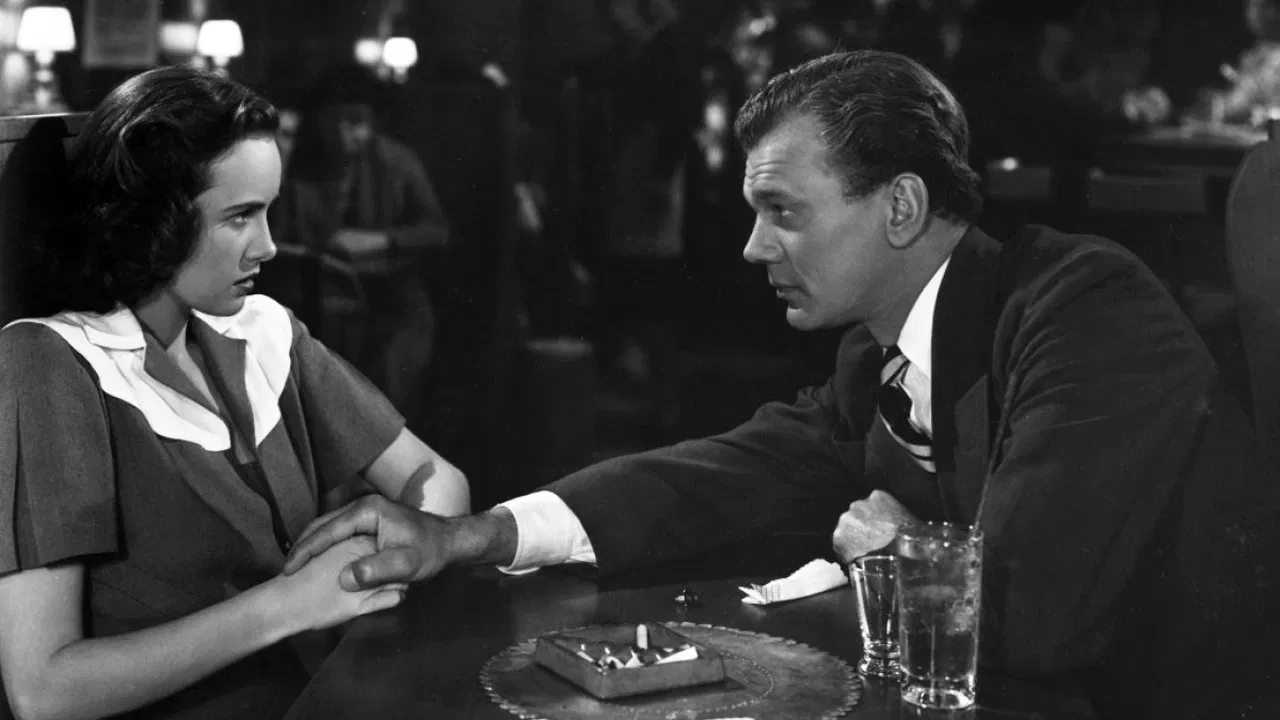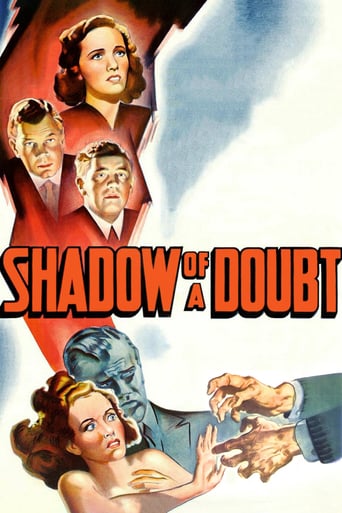

Charming and brutal
... View MoreBlistering performances.
... View MoreAmazing worth wacthing. So good. Biased but well made with many good points.
... View MoreThe story, direction, characters, and writing/dialogue is akin to taking a tranquilizer shot to the neck, but everything else was so well done.
... View More"Shadow of a Doubt" was the first truly American film by Alfred Hitchcock. His previous films in Hollywood had strong overtones of being in a British setting but that all changed after 1943 with the release of "Shadow of a Doubt." A psychopathic killer who is wanted in connection with a series of brutal killings, flees his home city and travels many miles to a small town where his relatives live. He attempts to conceal his real demeanour with that of being "the charming and easygoing long lost uncle." He maintains this facade until his niece (Teresa Wright) suspects her uncle is not quite what he claims to be. There soon develops a game of cat and mouse between uncle and niece as her suspicions lead to her distancing herself from him and his smokescreen gradually evaporating as a result. The scene where Wright looks up some old newspaper articles at the local library, is a major development in her discovering what her uncle really is. Joseph Cotton was usually cast as the decent and ordinary everyday kind of character. When I first discovered he played a killer in a Hitchcock movie, I had slight reservations as to his suitability and credibility. Boy was I wrong! The actor makes for a creepy and sinister murderer who shows no remorse for what he has done. Hitchcock got precisely the right of performance from Joseph Cotton, there is nothing theatrical or superficial about it. Teresa Wright does a good job in projecting both vulnerability and determination. It is quite disturbing how the rest of the family are completely unaware of what is happening during the film. To them, Cotton is just a kind and ordinary person, like the sort of person you pass in the street. Hitchcock's creative juices were in full flow in "Shadow of a Doubt."
... View MoreThe Newton family of Santa Rosa California receive an unexpected visit from their Uncle Charlie. He lives in Philadelphia and is a bit of a legend in the family, being a wealthy, self-made man. His niece, also named Charlie, is particularly fond of him. However, when he arrives, Uncle Charlie starts to act suspiciously. Soon two surveyors appear at the house and start to ask questions about Uncle Charlie. (Niece) Charlie starts to investigate and discovers that the two men are detectives and Uncle Charlie is a suspect in a nationwide manhunt and murder investigation. However, the closer she gets to the truth, the more her own life is potentially in danger.A reasonably intriguing Alfred Hitchcock crime drama. In typical Hitchcock fashion it unfolds slowly and deliberately, incrementally revealing just enough to keep you watching, while building up to a tense climax.Not among Hitchcock's best though. The build-up is perhaps too slow here. In addition, despite the title, there is not really that much doubt about whether Uncle Charlie is involved in the crimes, so the possibilities with regard to the outcome are limited. The conclusion thus feels a touch inevitable, though there are a few other ways it could have gone (however, none of these would have been as exciting or complete).
... View MoreSHADOW OF A DOUBT is a psychological thriller full of distrust and mystery. I've always wondered how Hitch enjoys uncertainty and tension in their films. In the idyllic environment and "unspoiled" town one (admired) character brings his dark secret. The director has made an almost perfect contrast.Hitch shows us in the very beginning of the film as one of the main characters is something wrong. This is perhaps the main drawback. We stayed poor for normal and superior change in the atmosphere. The entire film runs in a similar vein. The changes are visible, but not exaggerated. The highlight of surprises and tension is again excellent. After that, the atmosphere is a bit tense and depressed. In the second part of the film expressions of morality and solidarity are a bit strange. The world is a terrible place to live, and every now and then someone goes crazy. Given the theme of the movie, my statement can be cynical and justified at the same time.Scenography and acting are as usual at a high level. Teresa Wright as Charlotte "Charlie" Newton is the first part of the film victim of her own instincts and emotions, while in the second part of the film victim of the dangerous truth and "loved" person. Change in acting is visible and quite good. Joseph Cotten as Charles "Charlie" Oakley is a charming uncle, a killer and a scoundrel. It is difficult to simply consider a complex character. Prominent these psycho-physical mysterious moments when the beloved uncle feels threatened. Shadow of a doubt are expressed in both character. In the same moment. It's fascinating.The story is not convincing. However, the coincidence is no place in Hitchcock's style.Without some exaggerated doubt this is a very good movie.
... View MoreShadow of a Doubt was, according to the Director himself, Hitchcock's favorite of his films, most likely because it opened a door for his later work. He had moved past the point of merely trying to thrill an audience, instead towards shocking them. Coming from an outsider's perspective, Hitchcock saw America for what it was at the time: a culture obsessed with war and violence that wanted to bury the past. America had been involved in World War II for several years at this point, those left behind were mainly older people who had little to do outside of work. He knew people wanted to see a good murder-mystery, and he finally poked at people's interest in the subject, by putting them in the story.Beginning in the average home life of the time, Hitchcock unsettles everything by introducing Uncle Charlie. The viewer is immediately introduced to Charlie's world, where we understand right away that he is a murderer evading the police. But to his family, Uncle Charlie is a charming, charismatic, handsome man, who is also obviously disturbed in some way. The way the characters choose to ignore this fact is telling. Uncle Uncle Charlie obviously has some sort of past abuse of some form or another in order to be a violent criminal, and his character lets his resentment known a number of times. The fact that no one had even attempted at this point to examine what made someone this way is revolutionary, and is not merely a coincidence. Uncle Charlie seems intent on burying the past the same way everyday people at time also attempted. Regardless, he is desperate to bring the family together, even though it can't be ignored that he is a criminal trying to hide himself in a normal setting. The fact that Hitchcock had chosen to bring a killer into a family setting is the source of the film's suspense. He was trying to get under the skin of everyday people at the time. All he had to do to in order to achieve this, was put Uncle Charlie at a dinner table with everyday people. The dinner scene carries the entire significance of the film. All focus is put on Uncle Charlie during the scene. We see, in close up, Uncle Charlie summarize his harsh feelings towards his targets, in a way that the audience is unable to ignore. It defines the entire work, and it is masterfully executed. Make sure to watch intently as it happens.The entire film hints at something unseen. Alfred Hitchcock knew that suspense came from a more mysterious place, and this is him executing that at a masterful level.
... View More